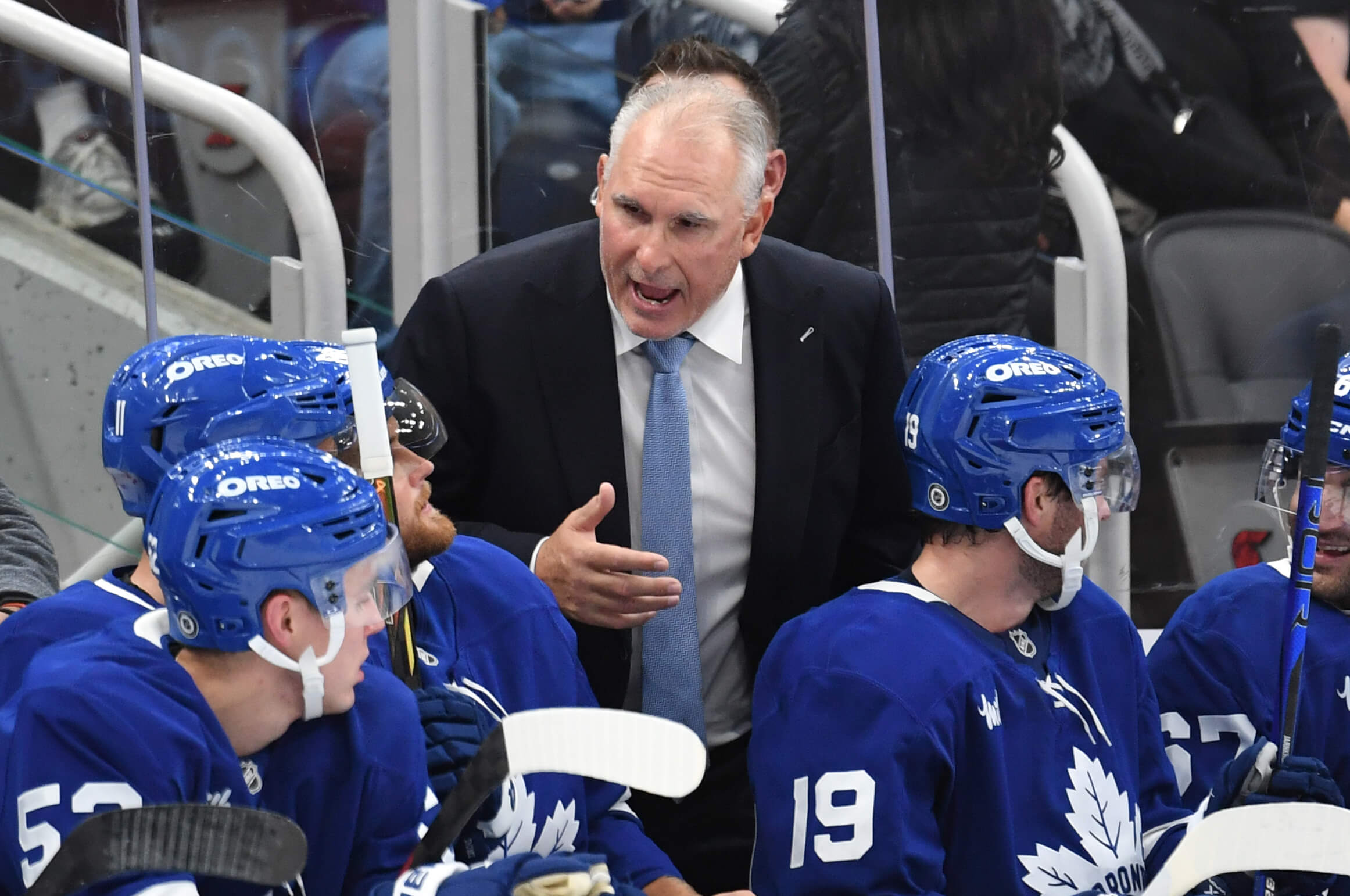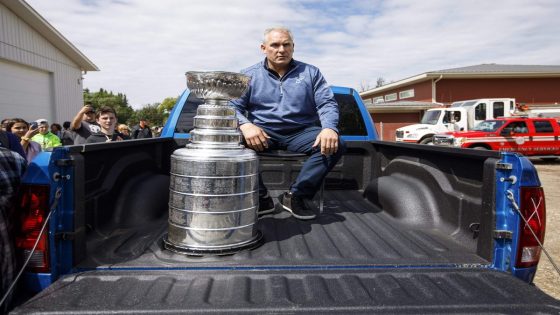Craig Berube leans back in a chair in his office in the Toronto Maple Leafs’ practice facility. As he clasps his hands behind his head he lets his mind wander.
At this moment, the Leafs head coach’s mind is caught between two places.
On Saturday, Berube will return to St. Louis. It will be his first game as Leafs head coach in the city where he established himself as an NHL bench boss. He knows he will be celebrated. And no surprise to anyone who knows the candid but oft-gruff coach: He won’t love that moment.
When Berube wants to truly feel at peace, he goes back to a place where he became the person he is today. The small hamlet is far, far away from The Gateway to the West and can easily get lost whenever anyone scrolls by it on a map. If it weren’t for Berube himself, it is a place that might be easily forgotten.
“It taught me to be a hardworking person, a loyal person,” Berube said of his Alberta hometown. “I think, more than anything, that’s Calahoo.”
Nearly everything Berube learned about how to coach the Blues and eventually the Leafs comes from a place nearly 3,000 kilometres away from where he’ll be on Saturday.
Technically speaking, Calahoo, Alta., rests a 40-minute drive from downtown Edmonton. But don’t let any directions fool you, it looks, sounds and feels like a world away from any Canadian metropolis.
Calahoo Meats, the only place nearby to secure steaks, is run by the Berube family. Calahoo’s one shop has a small wooden sign you must squint to find. It reads “Calahoo General Store.”
“We used to have a post office just out of someone’s house. It used to be in a store as well, but not anymore,” Berube’s mother, Ramona, said.
You don’t just wave and nod at the people you see every time you pass them driving on Calahoo’s handful of roads, you know everything about them. It’s a byproduct of living in a town with a population of 143, according to the 2021 Canadian census.
Berube grew up in the same small, white two-storey house his parents, Roger and Ramona, still call home today. Behind the Berube home, there used to be five trailers with aunts, uncles and cousins living in them. Berube’s grandmother lived in the closest home to them. The Leafs coach grew up understanding how to play your part in a team.
“We were together all the time, so we had a close bonding growing up with family,” Berube said.

Take a turn down Range Road 275 and outside the arena you’ll see a wooden statue of a man in an Indigenous headdress and Blues jersey hoisting the Stanley Cup. There’s a well-maintained fastball diamond backing onto the community arena. That hard, unflinching stare that’s common from Berube behind the bench might have first originated on the dirty mound in Calahoo. Before hockey, he had the makings of a pitcher who could easily toss some heat.
And before Berube was a teenager, he played for a team coached by his uncle Emile.
“He’d be hard on you,” Berube said of his uncle’s coaching style. “We practiced hard too. I mean practiced hard. Sliding, everything. We were taught well.”
And if young Berube didn’t follow instructions, Emile and the rest of the Berubes in attendance weren’t afraid to let the children hear about it. That’s how things were done and that’s how things are still done with him today.
Want to know where the Leafs’ new high-energy, intense brand of hockey comes from?
It was in Calahoo that Berube, the catalyst, could never slow down. The walls of the Berube home couldn’t contain young Craig.
“He was a hyper kid,” Ramona said, with a devilish chuckle. “He couldn’t wait to get out of the house. Even when he was sick, I had to keep him home. He was always moving, always running.”
In the winters, Berube’s father and his uncles insisted he should lace on skates and try the game on an outdoor rink.
“I took him down there, but he didn’t want to go. And I bugged him and said, ‘Dad would like you to go.’ He went, but he didn’t understand the game,” Ramona said, laughing.
More conversations followed. Berube learned the ins and outs of the game that would end up defining most of his life.
Once the Calahoo Arena was built, it was hard to pull Berube away from it. Did Ramona ever envision her son playing on biggest rinks of the world in the NHL?
“Never,” she insisted, cutting off the question before it was finished. “I didn’t ever think about it. Because he wasn’t a good skater.”
So, Berube wasn’t much of a skater. But the Craig Berube who amassed 3,149 penalty minutes in his NHL career, seventh-most in league history?
That comes from having, by his count, 17 cousins and two siblings living within a few doors.
“Living here with as many families as there was, they got into scraps. And he was a big boy,” Ramona said.
And so Berube developed his scrappy side in a place where he quite literally had to. But Berube also came to understand the importance of sticking by those closest to you. It was in Calahoo that Berube developed the values that stay ingrained in him to this day, like integrity, and being a good teammate.
Ramona remembers her son driving the two of them together on a snowmobile across a frozen road. Ramona took a tumble off into the snow. But Ramona distinctly recalls how Craig, who was becoming a bruiser of a hockey player, was overwrought with guilt over the fall. He stayed upset at himself for days afterward.
“Craig was a very sensitive person. You wouldn’t have thought so,” Ramona said.
The eagerness Berube displayed as a child never dissipated through his teens. The child who couldn’t sit still had yet to find something he could focus his energy on. A tryout with the St. Alberts Saints, a tier two junior team 20 minutes away and coached by Mark Messier’s father, Doug, was fruitless.
For Craig, it just couldn’t have been a life of farming, playing fastball and rarely leaving the Berube compound. Because as impatient as he was, those around Berube knew he needed a little real-world experience to ground him.
“I needed to get out,” Berube said. “I was a little wild. I was a little dumb, to be honest with you.”
The Berube family knew longtime coach Bill LaForge, himself an appreciator of overt physicality and then coach of the WHL’s Kamloops Junior Oilers. LaForge had connections throughout western Canada and told the family that another established coach, John Van Horlick, was looking for players for the Williams Lake Mustangs of the Jr. B Pacific Junior Hockey League.
Berube took a chance and did as many young people do: He went west, on a 10-hour drive to a place he’d never been.
Making the Mustangs was one thing. But when Berube got called up to the Junior Oilers of the WHL for four games at the end of the season, he was far out of his depth.
Berube himself mimics a zombie when describing how he played. And he heard about his ineffective play from his coach back in Williams Lake.

He thought he’d be heading back to Calahoo for a summer of fastball and odd jobs. Instead, Van Horlick told him he would live with eventual WHA star and Williams Lake star Ed “Rusty” Patenaude on his ranch. The work would be hard but good for Berube’s mind, body and particularly, his hands.
And every day, Van Horlick would pick Berube up for the ranch and bring him to his basement for hours of boxing lessons. No helmets, no mouth guards.
“That’s,” Berube remembers Van Horlick telling him, “how you’re going to get ready.”
Berube knew he could fight – he’d done it for years – but just didn’t know how. Van Horlick taught him how to land punches with fervour and protect himself. Berube didn’t know it at the time, but he had finally found his calling.
At the end of the summer, Berube’s parents were set to visit him for the first time in Williams Lake. To celebrate, he had signed up for a boxing competition at the Williams Lake Stampede called “So You Think You’re Tough.”
Berube knew he was tough. And his competitors soon find out.
In front of his parents, Berube won the competition and the $1,000 prize. He gave the prize money to his mother, perhaps as a thank you for years of raising him well. But perhaps also, as an apology.
“Oh my God, I felt so terrible,” Ramona said of her son’s newfound predilection for pugilism. “To see him fight? That was terrible for me.”
It was terrible for opponents too. Berube gained the necessary confidence from that summer, and the years of informal training he had in Calahoo, and took it to the WHL full-time for the next three successful seasons. And from there, an 18-year professional career.
By the time Berube became an established NHL player, his teammates could practically feel the inspiration of Calahoo in him as a teammate. The man who grew up in tight quarters with a large family wanted the same for young players.
“It didn’t matter if you were the top scorer or just getting called up from the minors. (Berube) treated younger players equally and made me feel comfortable,” Steve Konowalchuk, a longtime teammate, said of Berube’s approach.
Dinners out on the road were not for cliques if Berube had anything to say about it. If Berube was going to stand up for a teammate on the ice, he would be just as willing to do so off of it.
“No arrogance or ego involved. No hierarchy,” Konowalchuk said. “He made you feel like a veteran when you weren’t.”
The season after Berube retired in 2004, he stepped behind the bench for 20 more seasons of coaching. When he won the Stanley Cup with the Blues in 2019, there was only one place he could bring the trophy: To Calahoo, for a party in the home he grew up in.
It’s the same home Berube returns to every August for days spent with family and nights spent recounting old stories.
Every summer, the stories wind their way back to the fights Craig had in Calahoo and just beyond. Ramona reminds her son she still owes him $1,000. And every summer, Craig waves his hand away.
“You can keep it,” he says.
(Top photo of Craig Berube with the Stanley Cup in Calahoo, Alta.: Jason Franson / The Canadian Press via The Associated Press)





